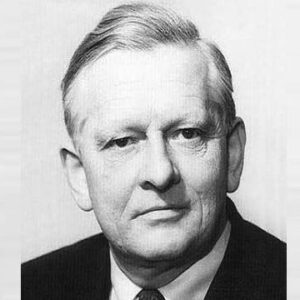Richard Kuhn was one of the twentieth century’s most eminent and successful biochemists. In 1938, he received the Nobel Prize in Chemistry for his research on vitamins and carotenoids. Due to the Nazis’ prohibition on German nationals receiving the Nobel Prize, he received his diploma and Gold Medal after World War II ended. Additionally, he discovered the nerve toxin ‘Soman,’ a very deadly chemical employed as a weapon of mass destruction. Kuhn’s scientific interests included theoretical issues in organic chemistry as well as broad areas of biochemistry (carotenoids, flavins, vitamins, and enzymes). Additionally, he conducted groundbreaking research on vitamin B2 and the antidermatitis vitamin B6.
Childhood & Adolescence
Richard Kuhn was born on December 3, 1900, in Vienna. Richard Clemens Kuhn, his father, was an engineer, and Angelika Rodler, his mother, was an elementary school teacher.
He attended school at the ‘Gymnasium’ (the Grammar school).
Richard Kuhn’s Career
Richard Kuhn studied chemistry at the University of Vienna and earned a Ph.D. in 1922 from the University of Munich under the supervision of R. Willstatter.
He began his career as a lecturer of chemistry at Munich University in 1925.
In 1926, he accepted an invitation from the Eidgenossische Technische Hochschule in Zurich to become a Professor of Analytical Chemistry, a position he held until 1929.
He was appointed Principal of the Institute of Chemistry at Heidelberg’s newly established Kaiser-Wilhelm-Institut (KWI) for Medical Research in 1930.
In 1937, he also succeeded L. Von Krehl as director of this institute.
In addition to the aforementioned, he served as Head of the Chemistry Department at the University of Heidelberg. He also spent a year as a visiting professor at the University of Pennsylvania’s Department of Psychological Chemistry in Philadelphia.
Richard Kuhn’s Research
Kuhn studied theoretical issues in organic chemistry and a wide range of topics in biochemistry, including carotenoids, flavins, vitamins, and enzymes.
He studied the structures of substances related to carotenoids, the fat-soluble yellow pigments found throughout nature.
He isolated eight carotenoids, purified them, and assessed their chemical composition. He discovered that one of them was required for the fertilization of certain algae.
He collaborated with Paul Karrer on Vitamin B2 research and was the first to isolate a gram of it. Additionally, he extracted Vitamin B6 with his team.
Awards and Accomplishments
Richard Kuhn was awarded the 1938 Nobel Prize in Chemistry for his work on “Investigations in Carotenoids and Vitamins.”
He was awarded the Wilhelm Exner Medal in 1952.
Several honorary degrees were bestowed to him by the Technische Hochschule in Munich (1960), the University of Vienna (1960), and the University of St. Maria Brazil (1960). (1961).
He served as President of the German Chemists’ Society and as Vice President of the Max Planck Society.
He was also a member of the board of directors of the ‘Badische Anilin und Soda-Fabrik’.
From 1948, he served as editor of the magazine ‘Justus Liebigs Annals der Chemie’.
Personal History and Legacies
Daisy Hartmann and Richard Kuhn were married in 1928 and had two boys and four daughters.
He died in Heidelberg, West Germany, on 31 July 1967, at the age of 66.
Estimated Net worth
Richard is one of the wealthiest biologists and is featured on the list of the most popular biologists. Richard Kuhn’s net worth is estimated to be $1.5 million, based on our analysis of Wikipedia, Forbes, and Business Insider.
Trivia
Richard Kuhn is alleged to have been a staunch admirer of the Nazis and aided in the development of Chemical Weapons of Mass Destruction for them. Additionally, he is alleged to have been responsible for the betrayal and prosecution of three of his fellow Jewish Scientists. This became public knowledge over 30 years after his death.
In 2005, the Society of German Chemists decided to suspend the ‘Richard Kuhn prize,’ which was presented annually to the top-performing German chemist.


